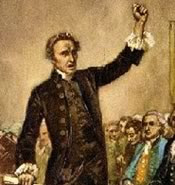
As a largely secular, urban Jew, my instinct is to be put off when politicians discuss questions of religion and morality. In no way am I anti-religious, but I have been conditioned to view religion as something that should remain within the confines of the private, not the public sphere. But, the more I read of the founding fathers, the less inclined I am to accept this view. Patrick Henry in particular presents the belief that "private" questions or values, morality and religion do have a great bearing on the public and political spheres of American life. Take a few minutes to contemplate the words of Mr. Henry and if you are atheist or agnostic you can still explore the ways in which the secular virtues and vices of individuals, communities and cultures shape the political, social and even economic life of a nation:
Bad men cannot make good citizens. It is impossible that a nation of infidels or idolaters should be a nation of freemen. It is when a people forget God that tyrants forge their chains. A vitiated state of morals, a corrupted public conscience, is incompatible with freedom. No free government, or the blessings of liberty, can be preserved to any people but by a firm adherence to justice, moderation, temperance, frugality, and virtue; and by a frequent recurrence to fundamental principles."
Those who are knowledgeable about other nations and cultures will agree with Mr. Henry's notion that individual liberty and limited government are only possible when the members of communities and nations have achieved a certain level of ethics, self restraint and respect for others. When they are lacking a nation faces the options of anarchy or authoritarianism. Countless past and present examples exist that demonstrates when (the majority of) a people lack a respect for rule of law and basic civic values, political, social and economic life becomes dysfunctional. Many progressives will respond that crime and corruption are products of poverty, which is problematic, because in nations like Pakistan and Nigeria, some of the worst examples of pilfer are found among the wealthy.
If you look below the surface, you will see that a shift in values and declines in certain virtues helped engender our great recession and on a broader level, our decline from a nation of savers and producers to one of spenders, consumers and unbearable private and public debt. Of course earlier generations were materialistic, however these impulses were moderated by values of frugality, temperance, hard work and a basic distrust of wealth not gained through hard work. I personally witnessed this with older landlords I work with who believed that "mortgages were irresponsible" and accordingly spent years working, scrounging and saving to purchase their property. The idea of using their homes as ATMs in order to live beyond their means was beyond the pale.
Even the fiscal hemorrhaging of entitlement programs is connected to a decline in virtue. During a documentary on the Great Depression, the actor Jerry Stiller spoke of the burning shame his father felt when economic circumstances forced him to seek government assistance. Clearly the values of self reliance and hard work served as "brakes" that moderated the use of the welfare state, whereas the sense of entitlement that pervades modern American life has become the "accelerator" that is helping to drive these programs over a fiscal cliff.
Bad men cannot make good citizens. It is impossible that a nation of infidels or idolaters should be a nation of freemen. It is when a people forget God that tyrants forge their chains. A vitiated state of morals, a corrupted public conscience, is incompatible with freedom. No free government, or the blessings of liberty, can be preserved to any people but by a firm adherence to justice, moderation, temperance, frugality, and virtue; and by a frequent recurrence to fundamental principles."
Those who are knowledgeable about other nations and cultures will agree with Mr. Henry's notion that individual liberty and limited government are only possible when the members of communities and nations have achieved a certain level of ethics, self restraint and respect for others. When they are lacking a nation faces the options of anarchy or authoritarianism. Countless past and present examples exist that demonstrates when (the majority of) a people lack a respect for rule of law and basic civic values, political, social and economic life becomes dysfunctional. Many progressives will respond that crime and corruption are products of poverty, which is problematic, because in nations like Pakistan and Nigeria, some of the worst examples of pilfer are found among the wealthy.
If you look below the surface, you will see that a shift in values and declines in certain virtues helped engender our great recession and on a broader level, our decline from a nation of savers and producers to one of spenders, consumers and unbearable private and public debt. Of course earlier generations were materialistic, however these impulses were moderated by values of frugality, temperance, hard work and a basic distrust of wealth not gained through hard work. I personally witnessed this with older landlords I work with who believed that "mortgages were irresponsible" and accordingly spent years working, scrounging and saving to purchase their property. The idea of using their homes as ATMs in order to live beyond their means was beyond the pale.
Even the fiscal hemorrhaging of entitlement programs is connected to a decline in virtue. During a documentary on the Great Depression, the actor Jerry Stiller spoke of the burning shame his father felt when economic circumstances forced him to seek government assistance. Clearly the values of self reliance and hard work served as "brakes" that moderated the use of the welfare state, whereas the sense of entitlement that pervades modern American life has become the "accelerator" that is helping to drive these programs over a fiscal cliff.
No comments:
Post a Comment